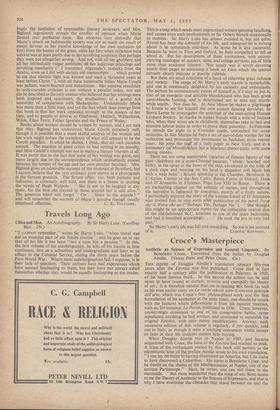Travels Long Ago
Cities and Men. An Autobiography. By Sir Harry Luke. (Geoffrey Bles. 25s.) "I CANNOT remember," writes Sir Harry Luke, "when travel was not an essential part of our family routine"; and he goes on to say that all his life it has been "not a taste but a passion." In this, the first volume of his autobiography, he tells of his travels in four continents, first as a schoolboy and undergraduate and later as an officer in the Colonial Service, during the thirty years befoie the First World War. Where most autobiographies fail, I suppose, is in their lack of selection. Their authors have had experiences which' have seemed fascinating to them, but they have not always asked themselves whether they would be equally fascinating to the reader. This is a trap which sends most unpractised writers spinning headlong, and causes even such professionals as Sir Osbert Sitwell occasionally to stumble. Sir Harry Luke has almost avoided it, but not qtflte. Travel has been the leitmotif of his life, and whenever he is writing about it he commands attention. At home he is less successful. Because he went to Eton and Oxford, he feels compelled to tell us about it. But his descriptions of these institutions, with accom- panying catalogue of masters, dons and college servants, are of little more than academic interest. Nor surely was it worth devoting nearly four pages to criticising a book on Eton which the quoted extracts clearly indicate is puerile rubbish.
But these are small criticisms of a book of otheiwise great richness and variety. The range of Sir Harry's early travels is remarkable, and one is continually delighted by his curiosity and enthusiasm. The picture he unconsciously paints of himself is, if I may so put it, that of an energetic and amiable blood-hound who has been given carte-blanche hunting, and is determined not to miss any worth- while smells. Nor does he. In Asia Minor he makes a pilgrimage to Konia to see for himself the now extinct dancing dervishes. In Sierra Leone he investigates the activities of the man-eating Human Leopard Society. In Alaska he makes friends with a tribe of Indiana who, when their wives are in childbirth, themselves take to bed and simulate labour pains in order to prove their paternity. In Palestine Ile spends the night in a Crusader castle, untouched for seven centuries. In San Marino he buys a set of out-of-date stamps for his collection and persuades- the postmaster to backdate them twenty years. He joins the staff of a daily paper in New Yoik, and in a monastery on Mounti,Athos has a hilarious, dinner-party with some fasting monks.
There are too some memorable vignettes of famous figures of the past—Salisbury on a cross-Channel steamer, "alone, bearded and bulky, in the spray in the bows of the ship, enveloped in the folds of a dark cape and wearing on his head a shapeless soft black hat With a wide brim"; Briand speaking in the Chamber, Bernhardt in L'Aiglon, Caruso at the San Carlo, Baron Corvo at Oxford, Duse and D'Annunzio in Florence, Pope Leo XIII in Rome. There is an enchanting chapter on the comedy of names, and throughout the narrative is. lightened by anecdotes, mostly of a fruity nature. I particularly enjoyed the story of the woman friend of D 'Annunzio who invited him to stay soon after publication of his novel Forse che st,-Forse che no ("Perhaps Yes, Perhaps No"). "She thought this might be an appropriate motto for the collapsible central disc of the old-fashioned W.C. attached to one of the spare bedrooms, and had it inscribed accordingly. . . . He took the jest in very bad part." Sir Harry's early life was full and rewarding, So too is his account


































 Previous page
Previous page